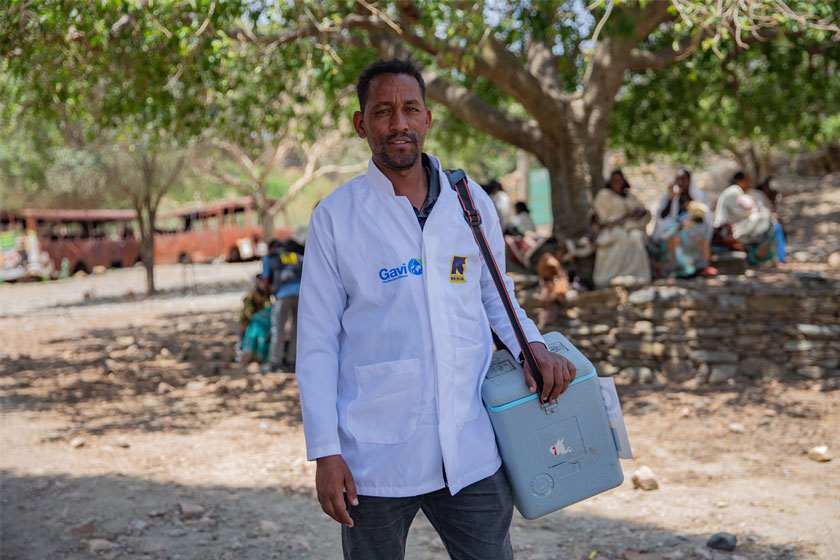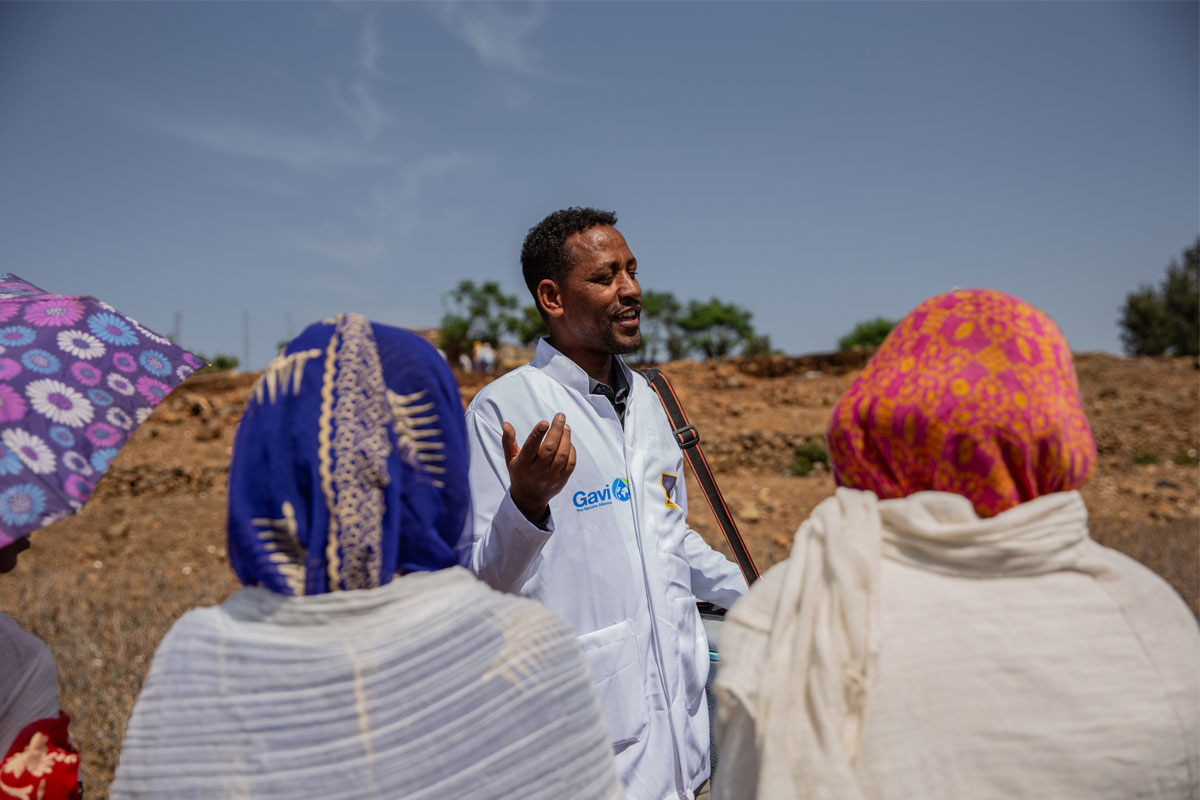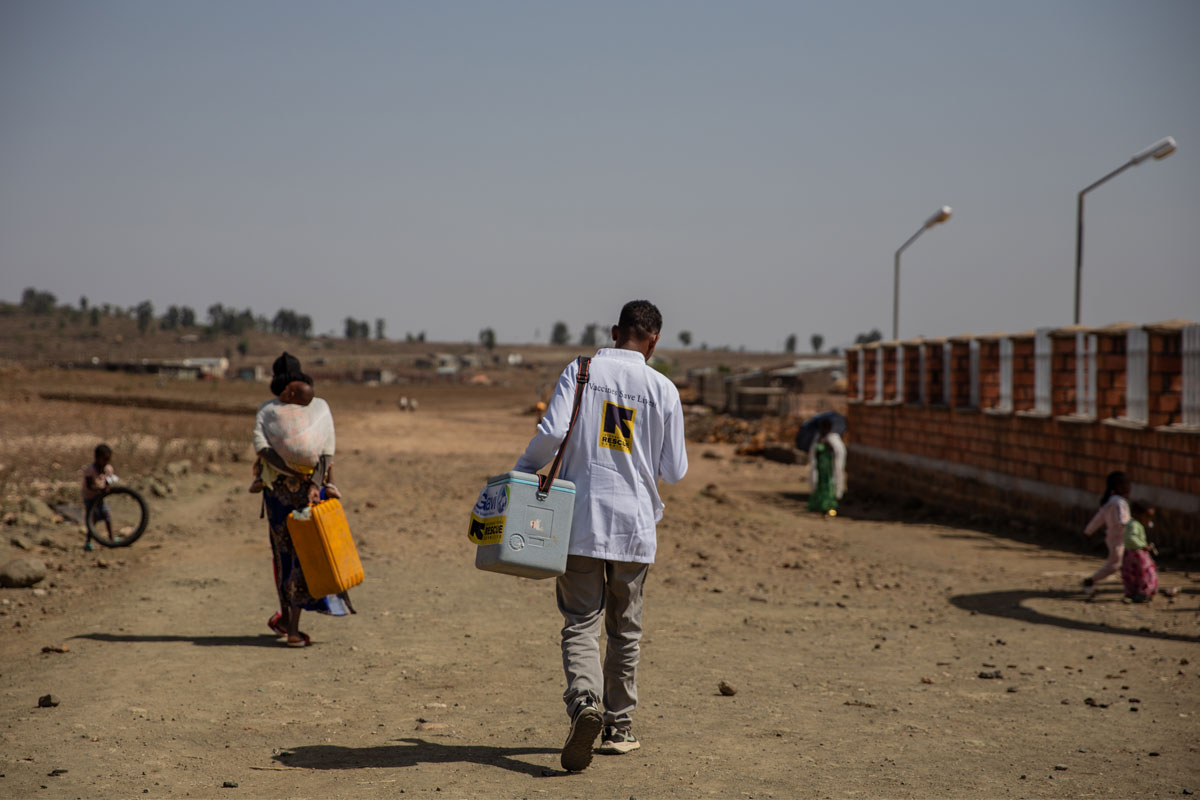The second line of defence: vaccinating children in Tigray
War is a recent memory for families in Tigray, and knock-on dangers from years of conflict still lurk. But vaccinators like Mebratu are on defensive manoeuvres.
- 25 November 2025
- 5 min read
- by Sarah Hunaidi

Tigray, in northern Ethiopia, spent most of the period between 2020 and 2022 roiled by civil war. Tens of thousands, even hundreds of thousands are estimated to have been killed in conflict; many more have died from war’s fatal knock-ons. Vaccinator Mebratu Gebreselasie Kidanemariam, 38, has witnessed some of the conflict’s youngest second-order casualties.
“Because of the war, there are children who weren’t able to receive the vaccine shot that was supposed to have been given at 45 days old. Illnesses which had been eradicated many years ago were seen to reappear en masse,” he explains. Now Mebratu, who works at Semamoket Hospital in Addiet District, is making it his business to change that, and get as many children as possible protected.

Helping mothers help their kids
His biggest challenge, he says, has been reaching remote communities. With reliable forms of transportation and fuel scarce, there have been days on which he has travelled five to six hours on foot, or by mule.
Through the Gavi-funded Reaching Every Child in Humanitarian Settings (REACH) project, which was launched in Addiet District in May 2023, those challenges have eased. Mebratu and his colleagues received support with transport, cold chain maintenance, training and outreach campaigns, which allowed them to resume vaccinations for children who had missed them for years, protecting thousands. The long and exhausting journeys, especially to isolated Adekebekli and Jira health centres and their health posts, have eased thanks to the fuel donations for the district’s motorbikes.

“A mother is considered to be someone who would do whatever it takes. So, we can definitely say Gavi is the mother of this district’s children,” Mebratu says “[The REACH partnership] worked to deliver the medication to the places we asked for it to be delivered, to increase the understanding of our community towards vaccines, and to improve knowledge of healthcare workers towards the vaccines.”
Have you read?
The vaccinator vividly recalls his first outreach to Hemore station, a six-hour journey on foot. “We were greeted by crying mothers who asked why we were talking about vaccines that had stopped long ago. They kept telling us that it was getting better before the outbreak of war, but now their children were becoming sick and dying after vaccination ceased. Mothers kept crying and asking if there would be vaccination. We told them that vaccines were indeed available.

“Seeing how deeply the mothers understood, and were striving to have their children vaccinated was something I will not be able to forget for the rest of my life.”
A regular day in an extraordinary life
A typical day for Mebratu begins early. “Whenever I have vaccinations to perform, I get everything ready the night before. I check for the medications I have and don’t have, the registration list, the items that accompany the medications, and check whether the community is informed about the vaccination.”
On outreach days, he often departs at 04:00, transporting vaccines via motorbike, car, or on foot if need be. He often won’t make it home until after 20:00.
But despite the steep demands of his work, Mebratu finds energy and purpose in it. “I have reasons why I love to serve as a vaccinator. A health professional works with children to save the lives of children. And children are the country’s next generation. If we want them to remain alive, vaccines should be available. This is why I want to be a vaccinator.”

Since the start of the REACH project, vaccination coverage in the district has improved significantly, from 39% in early 2023 to 100% in 2025, and illnesses like pertussis, measles, and mumps – which used to occur frequently – have now all but disappeared in Addiet. A total of 45,000 vaccine doses were administered by the REACH partnership between May 2023 and October 2025 in this vulnerable region. Mebratu hopes these trends keep travelling in the right direction. He says for that to happen, work needs to focus not only on vaccine distribution, but also on changing community behaviours towards more health seeking mindsets and supporting health workers.
How is Gavi supporting REACH?
Gavi’s humanitarian partnerships programme, also known as ZIP, funds partner organisations with specific expertise in navigating humanitarian crisis. The aim? To deliver all scheduled vaccine doses to children from birth to age five in communities where conflict impedes the access of government-provided health services.
The ZIP-funded REACH consortium is working across Chad, Ethiopia, Nigeria, Somalia, South Sudan, and Sudan to ensure that children in humanitarian settings receive their full routine immunisations, no matter how hard they are to reach.
As of September 2025, ZIP had provided more than 2.4 million children growing up in crisis zones with their very first vaccine, and 1.4 million children with their last recommended dose, leaving them fully immunised.





